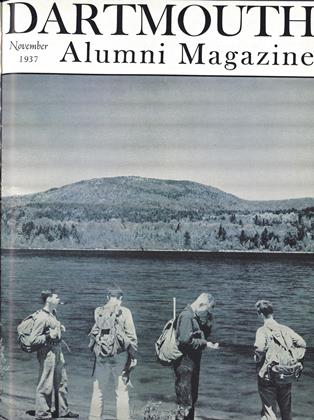REMARKS OF PRESIDENT HOPKINS, ONE OF THREE INAUGURALSPEAKERS, AT INDUCTION OF PRESIDENT DAY, OCTOBER 8
THE AMERICAN COLLEGE of liberal arts is too complex an organism to yield to easy characterization. A century ago it was the apex of American education. Today it is the base. Nevertheless, today the responsibility rests upon it of being the last formal educational process to which the majority of those enrolled within it will ever have easy access, while at the same time the obligation rests upon it to develop within a minority of its membership the stimulus of intellectual enthusiasm and the commitments to precision of thought which shall make those of this group desirable candidates for the graduate schools and the professional schools of the universities.
The role of the liberal college differs according to its environment. In one association within a university organization its function may be primarily to be the threshold to the halls of learning, accessible in the university of which it is a part. In the separate unit college its primary role may be to develop the sympathetic understanding of the cultural possibilities, the political ideals, and the spiritual needs of the great society of which its beneficiaries are to become members.
Its desirable role may differ in long established and stable communities from that which it ought to assume in newer settlements subjected to rapidly fluctuating conditions.
Its desirable role may differ from time to time somewhat along the line of Lord Macaulay's description of the respective contributions of the Whig and Tory parties to political thought in England. Herein was drawn an analogy to a ship, with assertion of necessity of balance between sail and ballast. If overweighted with ballast, progress would be impossible, but if overdressed with sail, the craft would founder before ever making port.
Its desirable role may differ according to circumstance, for instance, whether the public mind is overwhelmingly absorbed with conviction about the merits of rugged individualism or is largely intrigued by the arguments for a collectivist society.
It is to be assumed then that there are no fundamental principles which shall be accepted by the liberal college in determining its role? By no means! This is not to be conceded for a moment. The college is not entitled to be called "liberal" which does not take its stand and adhere to it upon the fundamental principles that freedom of inquiry, freedom of discussion, and freedom of speech are the inalienable rights of all who would not utilize these rights to destroy the freedom which makes them possible. From the Great Charter, down through the Bill of Rights, and the Petition of Rights, even to the present day, these rights have been fought for amongst our forebears in order that we might know the truth, and thereby be made free.
The function of the liberal college then, whether in one role or in another, is to establish within its disciples a habit ofmind, eager to know what truth is, persistent in attempt to find it, and loyal to its implications when conviction is acquired that it has been found. In order, however, that attempts to find what is true may be intelligently made, the habit of mind must be agnostic in regard to those things to which we are most accustomed or to which we are attracted by their apparent plausibility or toward which we lean because of self-interest. It is at this point in establishing such state of mind within its students that the liberal college most frequently causes distress and pain amongst groups of its devoted friends. These do not fully comprehend that the ultimate claim of the college to distinction and importance will rest upon the extent to which it has induced its disciples insistently to seek answers to the queries why? and what? and how? and when?
Walter Duranty in his volume I Write asI Please says that there is one term the significance of which the Bolshevist will never be able to comprehend, namely, "His Majesty's Opposition." How much more difficult it would be for such a one to understand the state of mind of a majority in the English Parliament voting an honorarium of $10,000.00 a year in addition to his salary to the leader of the minority Labor Party "in recognition of the fine service he renders in Parliament." It is the habit of mind which would take these things for granted that ought to result from educational processes of the liberal college.
Formerly the accepted role of the college was to implant in the student's mind that which was authoritatively asserted to be knowledge. Cumulatively down through modern times science has revealed to us into what a blind alley unexamined claims to authority may lead us. Hence it has become indispensable that we revise our conception and restate our objective to be that the college shall strive to develop in its students that sense of discrimination and that accuracy of judgment which shall enable them to discern what knowledge really is and how it may be found. Only so may our colleges teach truth and only so through them may knowledge of truth come to mankind.
 View Full Issue
View Full Issue
More From This Issue
-
 Article
ArticleThe Making of Civilized Men
November 1937 By ALEXIS CARREL -
 Article
ArticleGradus Ad Parnassum
November 1937 By THE EDITOR. -
 Class Notes
Class NotesClass of 1914
November 1937 By Edwrd Leech -
 Article
ArticleHanover's Most Illustrious Woman
November 1937 By GABRIEL FARRELL '11 -
 Class Notes
Class NotesClass of 1932
November 1937 By Edward B. Marls Jr -
 Class Notes
Class NotesClass of 1928
November 1937 By Osmun Skinner








